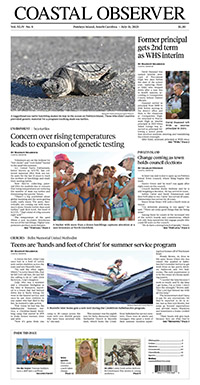Litchfield Beach
Rezoning of former water plant site prompts second suit from neighbors

Two property owners at Litchfield Beach who went to court to challenge a zoning change in their neighborhood filed a second suit this week against their community association claiming it failed in its duties by not opposing the change.
Ray Tanner and Salty Rims LLC, owners of two marshfront homes at Inlet Point South, say the zoning change to allow two new homes will block their ocean view and reduce the value of their homes by at least $100,000, according to court filings.
The Inlet Point South Community Association “has, without notice or a formal vote, allowed the plan to convert the land to residential lots for two new houses to proceed uninhibited,” according to the suit filed in Circuit Court. It says four of the five association board members had a conflict of interest because they would benefit from the sale of those lots.
Georgetown County Council approved a change to the Inlet Point South “planned development” zoning in 2023 to allow a tract used for a water treatment plant to be used as two homesites. Tanner, who is the athletics director at the University of South Carolina, and Salty Rims, filed suit earlier this year to overturn the rezoning.
A hearing in the zoning suit was scheduled for Thursday on a motion from the property owners to force the county to turn over records from the 1980s when the planned development was created. The owners claim in court documents that those records don’t exist. The issue was resolved before the hearing, the judge said.
The owners argue that the planned development could not be amended because it was never properly approved.
In the latest suit, the two owners claim that the five members of the community association board breached their fiduciary duty by failing to tell members about the proposed zoning change and failing to disclose that they had already agreed not to oppose it six months before outlining the change to the association members.
Inlet Point South is a gated community with 59 houses. Of those, 33 are with the Peninsula at Inlet Point South, which also has its own association.
The water plant was built to serve the Peninsula because that property is within a federal Coastal Barrier Zone and could not be served by the Georgetown County Water and Sewer District when it was developed in 1997.
When the district agreed to provide water in 2021, the treatment plant in the middle of Inlet Point South, owned by the Peninsula association, was decommissioned.
The Peninsula association proposed to sell the lots to fund ongoing beach renourishment in front of its 33 lots. It was estimated that the sale would raise $1.5 million, according to court documents.
As part of the rezoning request from the Peninsula, Georgetown County planning staff asked the Inlet Point South association to confirm it had no objection. According to the suit, that was done after polling the board members by email in June 2022.
But the suit also claims that four of the Inlet Point South board members, including then-president Christopher Lee, had a conflict of interest because they were property owners in the Peninsula “and would substantially financially benefit from the subdivision and sale of the land.”
In January 2023, the Inlet Point South board sent a PowerPoint presentation to all the members outlining the plan for the water treatment plant site and seeking input.
“The PowerPoint did not disclose that the IPS board had already approved of the plan to turn the property into residential lots,” according to the suit. “Amazingly the board presented the issue as if it had not already been decided.”
The suit claims the goal of the presentation was “to intentionally mislead” Inlet Point South property owners.
Adding two more lots to the 26 original Inlet Point South lots would increase the density and block the view of the ocean from the Tanner and Salty Rims property, which is across the street from the former water plant.
An affidavit from Rick Gilmer, a real estate agent who has handled sales in the development, said the new houses would reduce the value of that property.
“I would expect such diminution in value could execeed $100,000 on each of the Tanner and Salty Rims properties,” according to the filing.
The suit claims the community association board failed to act in the best interest of its members and was negligent in its actions. It seeks unspecified financial damages.
Update: This article was updated from the print version to reflect that the motion in the zoning case was resolved before the hearing.




